Gallo pinto is a Costa Rican and Nicaraguan dish of rice and beans cooked with peppers and onions. Serve it for breakfast, lunch, or dinner. It’s the perfect meal any time of day!
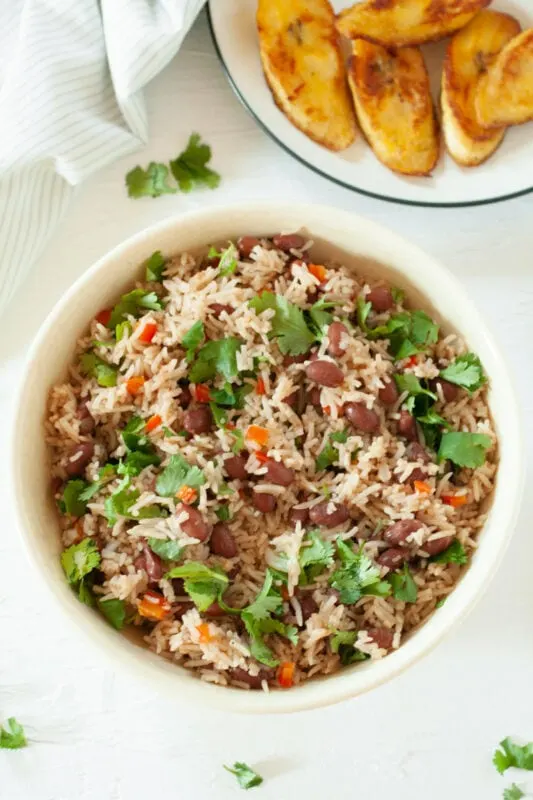
In most Latin American countries you will find rice and beans are a staple dish.
El Salvador has casamiento.
Brazil has their classic black beans.
Cost Rica and Nicaragua have gallo pinto.
What is gallo pinto?
Gallo pinto is a humble dish where beans and rice are first cooked separately, then they are cooked again, together, with peppers and onions.
It is a dish that arose from the peasant and worker classes, a dish of necessity and lack of resources. However practicality and necessity met the desire for good food, as the flavor elements added elevated the simple dish to one that is now nearly an art form.
What does gallo pinto mean?
Gallo pinto means “spotted rooster”. The name comes from the speckled appearance of the combination of the rice and beans.
In Costa Rica it is often just called “pinto”.
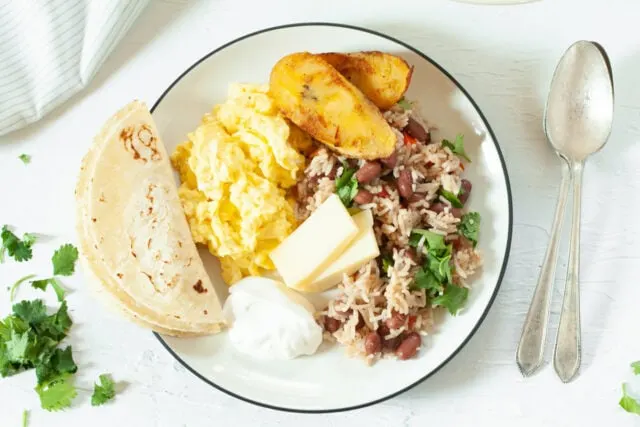
The history of this rice and beans dish
As for the origin of gallo pinto, both Costa Rico and Nicaragua claim the origin of the dish.
According to Costa Ricans, the dish was created in a neighborhood of San Jose in 1930.
Costa Rican legend goes that a small farm owner held a party and planned to serve a special spotted rooster that he had been fattening. However, more guests came to the party than he was expecting, and he needed more food to serve.
His kitchen staff quickly whipped up a big batch of rice and beans to feed the extra guests. Those guests who weren’t lucky enough to get a serving of poultry jokingly called the dish they were eating “gallo pinto” (which means “spotted rooster”).
Nicaraguans, on the other hand, hold that the dish is much older, with the basis for the dish originating from the African slaves who were brought to the Caribbean in the 17th and 18th centuries.

Where is gallo pinto most popular?
Both Costa Rica and Nicaragua claim the origin of gallo pinto and hold it as their national dish.
In Costa Rica, they use black beans for the dish, while in Nicaragua they use red beans.
In Costa Rica it is also typical to use a sweet and salty sauce called Salsa Lizano to season the rice and beans.
You can find Salsa Lizano on Amazon or at your local Latin grocer.
Some people say if you don’t have Salsa Lizano, Worcestershire sauce with a pinch of cumin added is a decent substitute. But, most Costa Ricans disagree and will tell you that there realy is not good substitute for Salsa Lizano. Without it, it’s really not Costa Rican gallo pinto.
How to make Costa Rican rice and beans
Like many rice and beans dishes, this one has a simple preparation, but it does have some essential elements that make the dish.
For this dish, onion, red pepper, cilantro, and Salsa Lizano (in Costa Rica) are those elements that make the dish. (In fact, they call the onion, pepper, and cilantro “olores” or “smells”, that make the dish.)
You start by sautéing onion and red pepper together. Then you add the canned beans (with a little liquid) and heat until the mixture simmers.
Then comes the cooked rice and Lizano sauce.
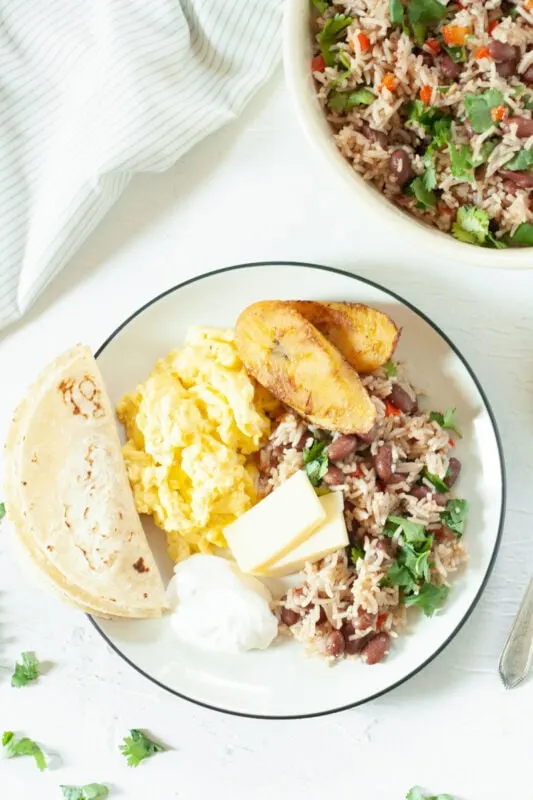
After mixing, you can taste for salt and pepper, and add to your liking.
Finally, you mix in the cilantro and serve!
How to serve gallo pinto
Gallo pinto is traditionally eaten for breakfast with natilla (Costa Rican sour cream), soft white cheese, scrambled eggs, tortillas, plantains, avocado, and coffee.
You can also find it served for lunch and dinner alongside your meat.
In Costa Rica they serve it with the same sweet and salty Salsa Lizano that they use in the dish.
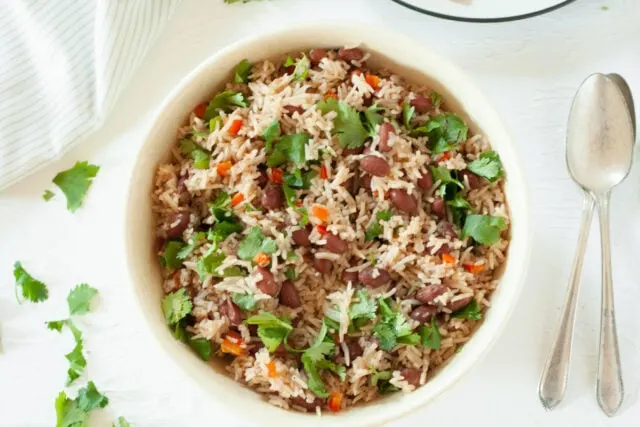
Have you made gallo pinto? How does your family do it? Let us know in the comments below!
Costa Rican Gallo Pinto (Rice and Beans)

Gallo pinto is a Costa Rican and Nicaraguan dish of rice and beans cooked with peppers and onions. Serve it for breakfast, lunch, or dinner. It's the perfect meal any time of day!
Ingredients
- 2 tsp vegetable oil
- 1/2 onion, chopped
- 1/2 red pepper, chopped
- 1 (15.5 ounce) can red beans
- 3 cups cooked rice
- 2 Tbsp Lizano sauce
- Salt and pepper to taste
- 1/2 cup cilantro, chopped
Instructions
- Heat the oil on medium heat. Sautee onion and red pepper for 3 to 5 minutes.
- Add canned beans with a little of the liquid, and cook for 2 minutes, or until the mixture starts to simmer.
- Add rice and Lizano sauce. Mix well.
- Taste for salt, add some if needed. Sprinkle in some black pepper and stir until well combined. (It should not be too dry. Add chicken broth or more bean water if it’s too dry.)
- Off of the heat, add the cilantro. Mix well, and serve.
Recommended Products
As an Amazon Associate and member of other affiliate programs, We earn from qualifying purchases.
Nutrition Information:
Yield:
6Serving Size:
1/6 of recipeAmount Per Serving: Calories: 163
If you liked this recipe, here are some similar dishes you may enjoy!

Lizet is Bolivian and lives in Paraguay. Through friends and travel she has developed her love of food. From Africa to Asia, Europe to the Americas, there is always something new to try when you come to dinner. You can find more of Lizet’s tasty creations on her website ChipaByTheDozen.com. You can also find her on Instagram and Facebook.



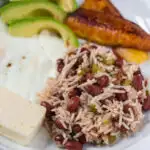
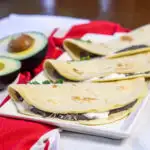


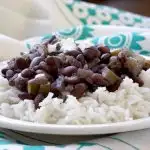
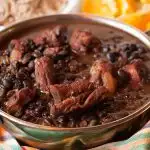
Marie
Monday 10th of October 2022
I'm wondering if the red pepper mentioned in the recipe is a hot or a sweet one.
Ana
Monday 11th of July 2022
That's is not how you make Nicaraguan gallo pinto .. for us is just rice and red beans .. we do not put salsa lizano, cilantro or bell peppers in it . Just fry a bit of onion with the beans and then add your rice best if the rice was from last night so it won't get soggy when mixing it in with the beans . Don't need all those ingredients to make gallo pinto .
Sarah Ozimek
Monday 18th of July 2022
Hi Ana. As you can see from the title of our article and recipe this is a recipe for the Costa Rican version of Gallo Pinto. We discuss the differences in the article, and do mention that in Nicaragua salsa lizano is not used.